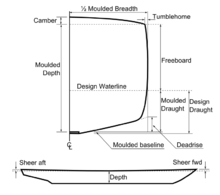
Camber (ship)
The camber is a measure of lateral main deck curvature in naval architecture. The curve is applied to a deck transversely, measured as the height of deck at centreline above the height of deck at side.
The practice of adding camber to a ship's deck originated in the era of small sailing ships. These vessels were built with the decks curving downwards at the sides in order to allow water that washed onto the deck to spill off. It adds to the ship's longitudinal strength also.
See also
References
Camber
Camber may refer to a variety of curvatures and angles:
Camber may also refer to:
Camber (band)
Camber was an American emo/post-hardcore band from New York City, recognized for being one of the pioneer of the second-wave Eastern indie emo sound. They were often compared to likes of Texas Is the Reason, Sunny Day Real Estate and Mineral. Roger Coletti replaced original drummer Chris Chin in 2001, before their final release.
Discography
External links
Camber (legendary king)
Camber, also Kamber, was the legendary first king of Cambria, according to the Geoffrey of Monmouth in the first part of his influential 12th-century pseudohistory Historia Regum Britanniae. According to Geoffrey, Cambria, the classical name for Wales, was named for him.
Camber was the son of Brutus, and a descendant of Aeneas of Troy. Upon his father's death he was given Cambria, while his younger brother Albanactus got Alba (the territory corresponding to modern Scotland; from Welsh Yr Alban) and his older brother Locrinus received Logres (corresponding to England; from Welsh Lloegr) and the title of King of the Britons. When Albanactus was murdered by Humber, King of the Huns, Camber joined Locrinus in attacking and defeating him.
Like many of the characters reported by Geoffrey, Camber has no historical basis but is the product of Geoffrey of Monmouth's imagination, invented largely for political ends within the contemporary Anglo-Norman world.
References

Ship
A ship is a large buoyant watercraft. Ships are generally distinguished from boats based on size, shape and cargo or passenger capacity. Ships are used on lakes, seas,rivers,and oceans for a variety of activities, such as the transport of people or goods, fishing, entertainment, public safety, and warfare. Historically, a "ship" was a sailing vessel with at least three square-rigged masts and a full bowsprit.
In armed conflict and in daily life, ships have become an integral part of modern commercial and military systems. Fishing boats are used by millions of fishermen throughout the world. Military forces operate vessels for naval warfare and to transport and support forces ashore. Commercial vessels, nearly 35,000 in number, carried 7.4 billion tons of cargo in 2007. As of 2011, there are about 104,304 ships with IMO numbers in the world.
Ships were always a key in history's great explorations and scientific and technological development. Navigators such as Zheng He spread such inventions as the compass and gunpowder. Ships have been used for such purposes as colonization and the slave trade, and have served scientific, cultural, and humanitarian needs. After the 16th century, new crops that had come from and to the Americas via the European seafarers significantly contributed to the world population growth.Ship transport has shaped the world's economy into today's energy-intensive pattern.
Ship (disambiguation)
A ship is a large vessel that floats on water, specifically the ocean and the sea.
Ship or ships may also refer to:
Acronyms:
In the arts:
Ship (comics)
The fictional A.I. entity originally known as Ship has appeared in several incarnations in the Marvel Universe. At times controlled by both the X-Men and their enemies, the sentient A.I. has at times been installed in the core of a Celestial starship, two space stations, and a techno-organic being. It is not related to Star-Lord's "Ship".
Fictional character biography
Ancient history
Ship's A.I. was created untold millennia ago by the Celestials as the operating system for a data collection device. The Celestials had genetically manipulated humanity, and they left the Ship in the area that would come to be known as Mongolia to monitor humanity's progress.
Circa 1100 A.D., a Mongolian immortal known as Garbha-Hsien (later known as Saul), discovered the Ship and lived next to it while he researched its mysteries. Saul never attempted to enter the Ship.
In time, the Egyptian immortal En Sabah Nur learned of Saul and sought him out as another immortal. In a confrontation, En Sabah Nur slew all of Saul's guards. Saul then sought to humble his fellow "forever-walker" by revealing the secret titanic vessel. Having had previous experience with futuristic technology due to his encounters with Rama-Tut, Nur attacked Saul and left the other immortal for dead and entered the Ship. He emerged later as a vastly changed being who now called himself Apocalypse.
Podcasts:

